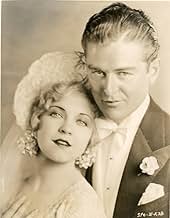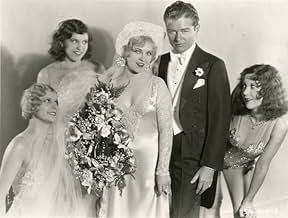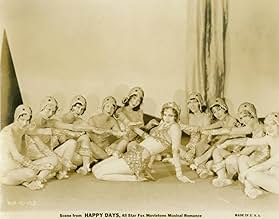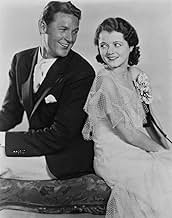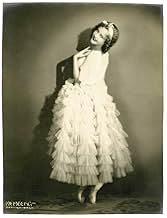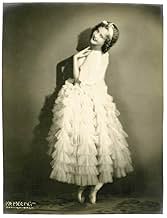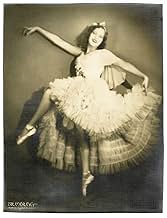Ajouter une intrigue dans votre langueIn Fox's contribution to the all-star revue cycle of early talkies, showboat singer Margie, hearing that the show is in arrears, goes to New York to gather all of the former stars to stage a... Tout lireIn Fox's contribution to the all-star revue cycle of early talkies, showboat singer Margie, hearing that the show is in arrears, goes to New York to gather all of the former stars to stage a minstrel show as a benefit.In Fox's contribution to the all-star revue cycle of early talkies, showboat singer Margie, hearing that the show is in arrears, goes to New York to gather all of the former stars to stage a minstrel show as a benefit.
- Prix
- 2 victoires au total
Avis en vedette
I refer to one of the cast in the chorus (as far as I know), Harry Lauder. You have flagged him up as the famous Scottish Variety Theatre singer, but that is incorrect. It was not Sir Harry Lauder, who was 60 in 1930.
The Harry Lauder (10 Nov 1902, Hamilton, Lanarkshire, Scotland, - 5 Dec 1951, Sydney, Australia, youngest surviving son of Matthew Currie Lauder) who appeared in "Happy Days" was Sir Harry's nephew, and also named Harry.
Harry II, as he liked to be known, was a child musical prodigy with a rich tenor's voice. Following The Great War his famous uncle, Sir Harry Lauder, sent him to Europe for a musical education, including Milan and Paris, where he had vocal training, and he subsequently sang in minor roles in Paris and Britain in Puccini and light opera. He then went to Chicago, U.S.A., where he appeared with the opera company, also undertaking training as a conductor. He then joined the U.S. Gilbert & Sullivan Rep.Co., and toured widely (notably in Richmond, Virginia.), both singing and conducting.
He subsequently conducted Fox Movietone News for 18 months before William Fox suggested he come to Hollywood to work for him there. He then moved to Los Angeles and set up a teaching studio in Glendale. It is unclear what he did for Fox in Hollywood, although he took minor roles in "Happy Days" (1930) (chorus) and several other Fox films, which seem to have gone largely unnoticed.
The Harry Lauder (10 Nov 1902, Hamilton, Lanarkshire, Scotland, - 5 Dec 1951, Sydney, Australia, youngest surviving son of Matthew Currie Lauder) who appeared in "Happy Days" was Sir Harry's nephew, and also named Harry.
Harry II, as he liked to be known, was a child musical prodigy with a rich tenor's voice. Following The Great War his famous uncle, Sir Harry Lauder, sent him to Europe for a musical education, including Milan and Paris, where he had vocal training, and he subsequently sang in minor roles in Paris and Britain in Puccini and light opera. He then went to Chicago, U.S.A., where he appeared with the opera company, also undertaking training as a conductor. He then joined the U.S. Gilbert & Sullivan Rep.Co., and toured widely (notably in Richmond, Virginia.), both singing and conducting.
He subsequently conducted Fox Movietone News for 18 months before William Fox suggested he come to Hollywood to work for him there. He then moved to Los Angeles and set up a teaching studio in Glendale. It is unclear what he did for Fox in Hollywood, although he took minor roles in "Happy Days" (1930) (chorus) and several other Fox films, which seem to have gone largely unnoticed.
Just about every major studio did at least one revue film in 1929 and 1930. MGM started the trend with the successful "Hollywood Revue of 1929" which still remains intact today. Since other studios were groping for successful formulas during the transition to sound, they naturally jumped on the bandwagon. However, none of them except maybe "Paramount on Parade" came off as well as Hollywood Revue.
Fox did a revue before this film, the now lost "Fox Movietone Revue". This was their second effort, and it actually has a plot so that there is a reason for the show. Colonel Billy Batcher has a show boat that plods along the Mississippi. However, with the coming of talking pictures he can no longer compete and his showboat is attached by a sheriff for back payment of debts. Margie, raised by the colonel, decides to go to New York to ask the big stars that got their start in the colonel's show to give him a hand.
Strangely enough, all of the stars belong to one New York club, also strange is that all of the alumni of the colonel's show seem to be signed with Fox, and even stranger yet they are all men since this is a "men only" club. How Margie gets into the club is one of the most humorous parts of the film. The scene inside the club is quite interesting as we get to see all of the male stars of Fox at the time, including those that don't have very big parts in the revue itself including Warner Baxter and Will Rogers.
The solution to the colonel's problems, of course, lie in the big Fox movie stars doing a revue for his benefit. The revue portion is only the second part of the film. Again, the revue largely segregates the men from the women in the performances given. The first part of the revue is a minstrel show with all of the stars in black face. As each is addressed by the interlocutor, the star's face turns from black to white - an odd photographic trick to make the star recognizable to the audience perhaps. Featured performers in this part are Frank Richardson singing "Mona" and Victor McLaglen and Edmund Lowe singing a buddy song. Lost as a fact to today's audiences, McLaglen and Lowe did several buddy pictures for Fox in the early sound era.
The minstrel section closes and several individual acts come up, including two great jazz numbers - "Crazy Feet" performed by Dixie Lee and chorus and "Snake Hips" performed by Sharon Lynn, Anne Pennington, and chorus. Look for Betty Grable in the chorus - she's in there. Charles Farrell and Janet Gaynor perform a romantic duet singing "We'll Build a Little World of Our Own". The whole thing closes with Whispering Jack Smith singing the title song of "Happy Days" to battling lovers Margie and Dick.
What is wrong with this film? Like all of the revues done at the time, Fox forgot that revues were about displaying your biggest assets - the studio stars, not necessarily the numbers and skits in the revue themselves. Nobody in the show provides any context or in some cases, even names for the stars as they are introduced to perform. Given how film history turned out, the choice of focus just seems odd. Great attention is paid to Victor McLaglen, Edmund Lowe, and El Brendel. Unless you are a classic movie fanatic you won't have any idea who these people are today, with the exception of McLaglen, and that is because of films he did long after he left Fox behind. Charles Farrell and Janet Gaynor are not even introduced, and maybe in 1929 no introduction was deemed necessary, but today most people would be wondering who on earth these people were. That particularly holds true for Farrell. Finally, the biggest stars Fox had on contract at the time - George Jessel, Warner Baxter, and Will Rogers are invisible after the short comic scene in the men-only club in New York. This is what MGM got right about its revue - it introduced each star as he/she performed and talked a little about what they had been doing at the studio.
The best thing this picture has going for it is Marjorie White as Margie, and she wasn't even a contract Fox player. She's funny and bursting with energy, and probably best known as playing the female lead in the first Three Stooges short a year before she died in a car accident in 1935.
I'd still recommend this film for fans of the early talkies and of film history, but everybody else will probably be lost.
Fox did a revue before this film, the now lost "Fox Movietone Revue". This was their second effort, and it actually has a plot so that there is a reason for the show. Colonel Billy Batcher has a show boat that plods along the Mississippi. However, with the coming of talking pictures he can no longer compete and his showboat is attached by a sheriff for back payment of debts. Margie, raised by the colonel, decides to go to New York to ask the big stars that got their start in the colonel's show to give him a hand.
Strangely enough, all of the stars belong to one New York club, also strange is that all of the alumni of the colonel's show seem to be signed with Fox, and even stranger yet they are all men since this is a "men only" club. How Margie gets into the club is one of the most humorous parts of the film. The scene inside the club is quite interesting as we get to see all of the male stars of Fox at the time, including those that don't have very big parts in the revue itself including Warner Baxter and Will Rogers.
The solution to the colonel's problems, of course, lie in the big Fox movie stars doing a revue for his benefit. The revue portion is only the second part of the film. Again, the revue largely segregates the men from the women in the performances given. The first part of the revue is a minstrel show with all of the stars in black face. As each is addressed by the interlocutor, the star's face turns from black to white - an odd photographic trick to make the star recognizable to the audience perhaps. Featured performers in this part are Frank Richardson singing "Mona" and Victor McLaglen and Edmund Lowe singing a buddy song. Lost as a fact to today's audiences, McLaglen and Lowe did several buddy pictures for Fox in the early sound era.
The minstrel section closes and several individual acts come up, including two great jazz numbers - "Crazy Feet" performed by Dixie Lee and chorus and "Snake Hips" performed by Sharon Lynn, Anne Pennington, and chorus. Look for Betty Grable in the chorus - she's in there. Charles Farrell and Janet Gaynor perform a romantic duet singing "We'll Build a Little World of Our Own". The whole thing closes with Whispering Jack Smith singing the title song of "Happy Days" to battling lovers Margie and Dick.
What is wrong with this film? Like all of the revues done at the time, Fox forgot that revues were about displaying your biggest assets - the studio stars, not necessarily the numbers and skits in the revue themselves. Nobody in the show provides any context or in some cases, even names for the stars as they are introduced to perform. Given how film history turned out, the choice of focus just seems odd. Great attention is paid to Victor McLaglen, Edmund Lowe, and El Brendel. Unless you are a classic movie fanatic you won't have any idea who these people are today, with the exception of McLaglen, and that is because of films he did long after he left Fox behind. Charles Farrell and Janet Gaynor are not even introduced, and maybe in 1929 no introduction was deemed necessary, but today most people would be wondering who on earth these people were. That particularly holds true for Farrell. Finally, the biggest stars Fox had on contract at the time - George Jessel, Warner Baxter, and Will Rogers are invisible after the short comic scene in the men-only club in New York. This is what MGM got right about its revue - it introduced each star as he/she performed and talked a little about what they had been doing at the studio.
The best thing this picture has going for it is Marjorie White as Margie, and she wasn't even a contract Fox player. She's funny and bursting with energy, and probably best known as playing the female lead in the first Three Stooges short a year before she died in a car accident in 1935.
I'd still recommend this film for fans of the early talkies and of film history, but everybody else will probably be lost.
Fox's all-star musical revue is short on star power, but there are a few terrific numbers here.
The plot revolves around a bunch of Broadway stars who get coerced into trying to save a show boat by doing a benefit show. Of course the sets make little sense as they could hardly fit on a show boat stage, but the minstrel theme (similar to the opening of MGM's all-star revue, THE Hollywood REVUE OF 1929) is used to introduce the various acts.
Among the better known stars here are Fox's #1 romantic team of Janet Gaynor and Charles Farrell, who sing "We'll Build a Little World of Our Own." Gaynor would remain a big star throughout the 30s, but Farrell struggled with his voice and had only a so-so career in talkies.
Victor McLaglen and Edmund Lowe sing a novelty song called "Vic and Eddie." Ann Pennington does a terrific dance to "Snake Hips," which is sung by Sharon Lynn. The dynamic Marjorie White and Richard Keene sing "I'm on a Diet of Love." Frank Richardson sings "Mona." Whispering Jack Smith sings the title song of "Happy Days." Other stars who appear include George Jessel (but he doesn't sing), Walter Catlett, William Collier, El Brendel, Frank Albertson, Stu Erwin, Tom Patricola, Nick Stuart, Rex Bell, Warner Baxter, Will Rogers, Dixie Lee, and boxer Jim Corbett.
Lots of energy here and Marjorie White (in her film debut) probably comes off best. She died in a car wreck in 1935. At only 4' 10" White was a dynamo of musical and comedy talent and had good supporting roles on Fox's JUST IMAGINE and SUNNYSIDE UP.
Of all the studio all-star revues, which often introduced many silent stars to talkies, HAPPY DAYS holds its own with THE Hollywood REVUE OF 1929 (MGM) and PARAMOUNT ON PARADE (Paramount) despite the lack of musical star power.
The plot revolves around a bunch of Broadway stars who get coerced into trying to save a show boat by doing a benefit show. Of course the sets make little sense as they could hardly fit on a show boat stage, but the minstrel theme (similar to the opening of MGM's all-star revue, THE Hollywood REVUE OF 1929) is used to introduce the various acts.
Among the better known stars here are Fox's #1 romantic team of Janet Gaynor and Charles Farrell, who sing "We'll Build a Little World of Our Own." Gaynor would remain a big star throughout the 30s, but Farrell struggled with his voice and had only a so-so career in talkies.
Victor McLaglen and Edmund Lowe sing a novelty song called "Vic and Eddie." Ann Pennington does a terrific dance to "Snake Hips," which is sung by Sharon Lynn. The dynamic Marjorie White and Richard Keene sing "I'm on a Diet of Love." Frank Richardson sings "Mona." Whispering Jack Smith sings the title song of "Happy Days." Other stars who appear include George Jessel (but he doesn't sing), Walter Catlett, William Collier, El Brendel, Frank Albertson, Stu Erwin, Tom Patricola, Nick Stuart, Rex Bell, Warner Baxter, Will Rogers, Dixie Lee, and boxer Jim Corbett.
Lots of energy here and Marjorie White (in her film debut) probably comes off best. She died in a car wreck in 1935. At only 4' 10" White was a dynamo of musical and comedy talent and had good supporting roles on Fox's JUST IMAGINE and SUNNYSIDE UP.
Of all the studio all-star revues, which often introduced many silent stars to talkies, HAPPY DAYS holds its own with THE Hollywood REVUE OF 1929 (MGM) and PARAMOUNT ON PARADE (Paramount) despite the lack of musical star power.
Seems like every third sound film of 1929-1930 either was a musical or had a lot of musical numbers in it. Last night I finally decided to watch a musical I've had sitting around for over a year. I was very pleasantly surprised by the film! "Happy Days" (1929) advertises itself as a film with over 100 great entertainers. It certainly isn't bad for a Fox produced film. This one has as its main star Marjorie White, but it features Charles E. Evans and Richard Keene, but it also has in it: Will Rogers, George Jessel, Warner Baxter, Janet Gaynor, Charles Farrell, El Brendel, Victor McLaglen, Edmund Lowe, Stuart Erwin, James J. Corbett (yes, the boxer!), William Collier, Sr., Rex Bell, Walter Catlett, and I'm not finished. If you look in the chorus line, there's Betty Grable. Oh, did I mention Dixie Lee (at this time helping promote the career of her husband, Bing Crosby), Nick Stuart, Frank Albertson, 'Whispering' Jack Smith, Ann Pennington, J. Farrell MacDonald, Lew Brice, Sharon Lynn, Tom Patricola, Tom Kennedy, Lucien Littlefield, and I'm tired of writing these names...
Show actually is not just a revue, but revolves around a story. White's father, Charles E. Evans is captain of a Show Boat. It's going broke and he can't pay the piper. She decides she's going to New York to the night clubs and round up all the performers who had their beginnings with her pop on the boat and bring them back to the boat for a show to save the boat and her pop. Of course she only needs to go to one night club - at least it looks that way in the movie - and everybody wants to do his or her bit. It evidently works, because when the film ends, it's after the last number, with no thank yous, good byes, or "It's a success!". It just ends.
Best number by far is the Ann Pennington dance "Snake Hips", also with Sharon Lynn, followed by the Dixie Lee rendition of "Crazy Feet". Farrell and Gaynor sing a song that probably should have remained unsung. McLaglen and Lowe do a routine that jokes about their Quirt and Flagg routines in their soldier movies, though it never mentions Quirt and Flagg, only McLaglen and Lowe. Lots of other numbers and routines. Only one that was just plain stupid, and that was El Brendel. I know, some just love the guy. Oh, well, to each his/her own.
Highly recommended for those interested in the early sound musicals. This is basically Fox's answer to all the revues done in those first couple of years by the different studios. It's quite good. 80 minutes or just a few more. It won't grate if you know what you're getting into. For those only looking for "Singin' in the Rain" or "Cabaret", stay away or sit back and learn. If you look at the viewer ratings on the IMDb, they range from 1 star to 9. Most are 7 or 8, so most have enjoyed it; but there are certainly exceptions. For the record, the sound and the photography are spot on, not so much the creaky early stuff. Some of the songs aren't perfect in any sense by modern standards sound-wise, but for the day are quite decent. Much of the revue style music is straight on camera shots, but there are a few that seem precursors to Busby Berkeley. This is also the second film released in 70mm wide screen. It's the debut films of both Marjorie White and Betty Grable.
Show actually is not just a revue, but revolves around a story. White's father, Charles E. Evans is captain of a Show Boat. It's going broke and he can't pay the piper. She decides she's going to New York to the night clubs and round up all the performers who had their beginnings with her pop on the boat and bring them back to the boat for a show to save the boat and her pop. Of course she only needs to go to one night club - at least it looks that way in the movie - and everybody wants to do his or her bit. It evidently works, because when the film ends, it's after the last number, with no thank yous, good byes, or "It's a success!". It just ends.
Best number by far is the Ann Pennington dance "Snake Hips", also with Sharon Lynn, followed by the Dixie Lee rendition of "Crazy Feet". Farrell and Gaynor sing a song that probably should have remained unsung. McLaglen and Lowe do a routine that jokes about their Quirt and Flagg routines in their soldier movies, though it never mentions Quirt and Flagg, only McLaglen and Lowe. Lots of other numbers and routines. Only one that was just plain stupid, and that was El Brendel. I know, some just love the guy. Oh, well, to each his/her own.
Highly recommended for those interested in the early sound musicals. This is basically Fox's answer to all the revues done in those first couple of years by the different studios. It's quite good. 80 minutes or just a few more. It won't grate if you know what you're getting into. For those only looking for "Singin' in the Rain" or "Cabaret", stay away or sit back and learn. If you look at the viewer ratings on the IMDb, they range from 1 star to 9. Most are 7 or 8, so most have enjoyed it; but there are certainly exceptions. For the record, the sound and the photography are spot on, not so much the creaky early stuff. Some of the songs aren't perfect in any sense by modern standards sound-wise, but for the day are quite decent. Much of the revue style music is straight on camera shots, but there are a few that seem precursors to Busby Berkeley. This is also the second film released in 70mm wide screen. It's the debut films of both Marjorie White and Betty Grable.
When the showboat she performs on is threatened with repossession, Marjorie heads to New York where she persuades all the stars there -- which seems to be the list of Fox contract players -- to perform in a minstrel show to lift the mortgage.
Yes, much of it is in blackface. Performers in solo and specialty numbers have the make-up removed, and the last twenty minutes or so is performed without the hated shoe polish. This is a good one, not for the number in which Edmund Lowe and Victor Mclaglen sing about how they really like each other, or for Charles Farrell and Janet Gaynor singing the forgettable "We'll Build A World Of Our Own." But Broadway star Charles MacFarlane has a fine singing voice; Tom Patricola does a dynamite eccentric dance; and to watch Ann Pennington and Sharon Lynne dance "Snake Hips" in very revealing costumes is a treat.
This was the second movie shot in Fox's Grandeur Process, an early 70mm format. Unhappily, the copies at are available are in standard format and rather blurry. But there are some surprising techniques, like a Busby Berkeley shot and extended sequence of single dancers in full body length, well before these techniques became standard.
It's one of those movies that the major studios made in this brief period, showing off their stars in song and dance, whether they could sing, dance or not. Given the inherently mixed bag nature of the genre, this is a pretty good example of the revue format.
Yes, much of it is in blackface. Performers in solo and specialty numbers have the make-up removed, and the last twenty minutes or so is performed without the hated shoe polish. This is a good one, not for the number in which Edmund Lowe and Victor Mclaglen sing about how they really like each other, or for Charles Farrell and Janet Gaynor singing the forgettable "We'll Build A World Of Our Own." But Broadway star Charles MacFarlane has a fine singing voice; Tom Patricola does a dynamite eccentric dance; and to watch Ann Pennington and Sharon Lynne dance "Snake Hips" in very revealing costumes is a treat.
This was the second movie shot in Fox's Grandeur Process, an early 70mm format. Unhappily, the copies at are available are in standard format and rather blurry. But there are some surprising techniques, like a Busby Berkeley shot and extended sequence of single dancers in full body length, well before these techniques became standard.
It's one of those movies that the major studios made in this brief period, showing off their stars in song and dance, whether they could sing, dance or not. Given the inherently mixed bag nature of the genre, this is a pretty good example of the revue format.
Le saviez-vous
- AnecdotesThe second film released in 70mm widescreen (The Big Trail (1930) was the first).
- Autres versionsFilmed and released in two versions: standard (35 mm) and widescreen in the Grandeur process (70 mm). For its premiere showing, the widescreen version played at the Roxy Theatre in New York City, and was the first film ever shown entirely in widescreen. No print of the widescreen version is known to exist.
- ConnexionsFeatured in Biography: Betty Grable: Behind the Pin-up (1995)
- Bandes originalesWe'll Build a Little World of Our Own
(uncredited)
Music by James F. Hanley
Lyrics by James Brockman
Copyright 1930 by Red Star Music Co. Inc
Performed by Janet Gaynor and Charles Farrell
Meilleurs choix
Connectez-vous pour évaluer et surveiller les recommandations personnalisées
Détails
- Durée1 heure 20 minutes
Contribuer à cette page
Suggérer une modification ou ajouter du contenu manquant

Lacune principale
By what name was Happy Days (1929) officially released in Canada in English?
Répondre
